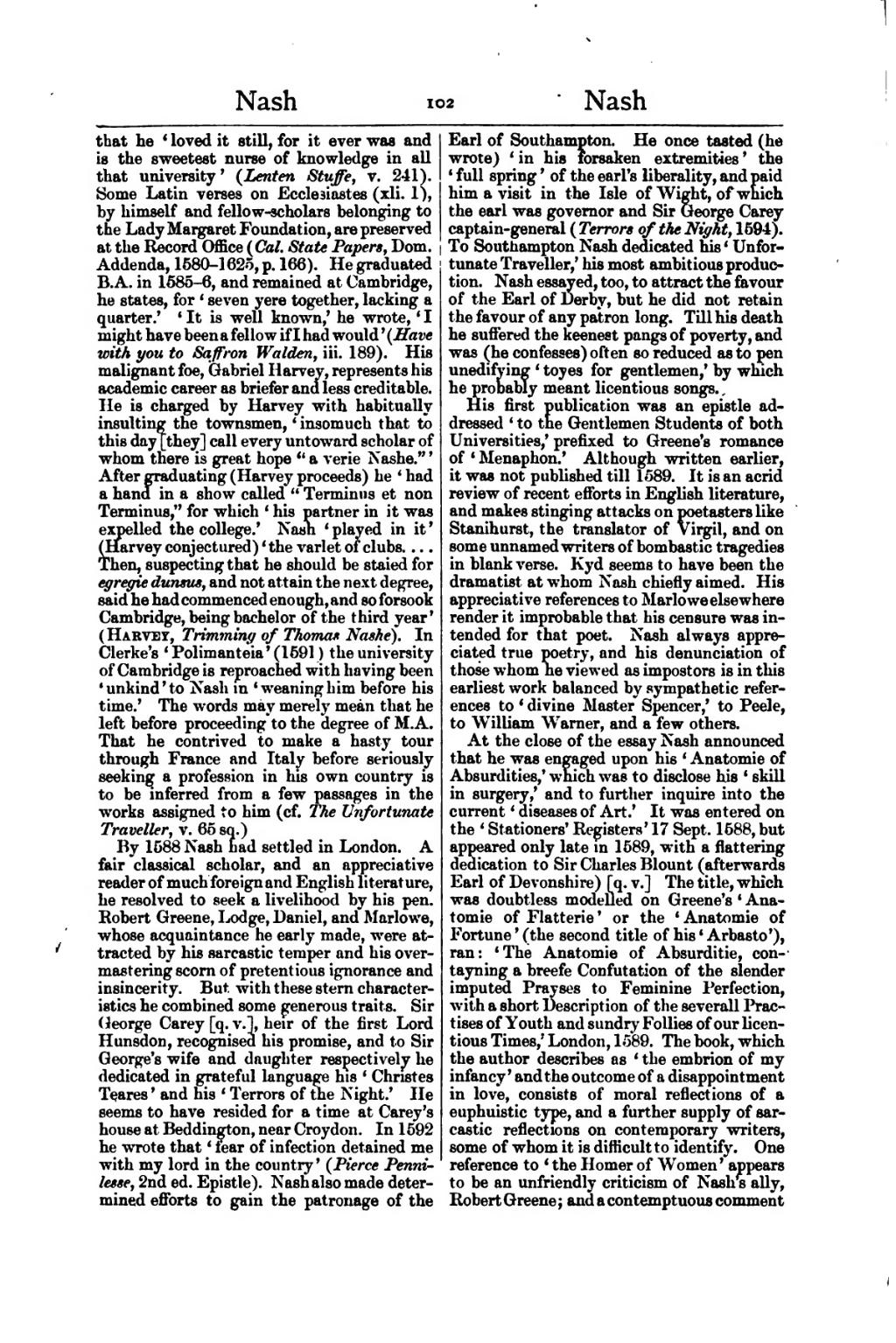that he 'loved it still, for it ever was and is the sweetest nurse of knowledge in all that university' (Lenten Stuffe, v. 241). Some Latin verses on Ecclesiastes (xli. 1), by himself and fellow-scholars belonging to the Lady Margaret Foundation, are preserved at the Record Office (Cal. State Papers, Dom. Addenda, 1580–1625, p. 166). He graduated B.A. in 1585–6, and remained at Cambridge, he states, for ‘seven yere together, lacking a quarter.’ ‘It is well known,’ he wrote, ‘I might have been a fellow if I had would’ (Have with you to Saffron Walden, iii. 189). His malignant foe, Gabriel Harvey, represents his academic career as briefer and less creditable. He is charged by Harvey with habitually insulting the townsmen, ‘insomuch that to this day [they] call every untoward scholar of whom there is great hope "a verie Nashe."’ After graduating (Harvey proceeds) he ‘had a hand in a show called “Terminus et non Terminus,” for which ‘his partner in it was expelled the college.’ Nash ‘played in it’ (Harvey conjectured) ‘the varlet of clubs. … Then, suspecting that he should be staied for egregie dunsus, and not attain the next degree, said he had commenced enough, and so forsook Cambridge, being bachelor of the third year’ (Harvey, Trimming of Thomas Nashe). In Clerke's ‘Polimanteia’ (1591) the university of Cambridge is reproached with having been ‘unkind’ to Nash in ‘weaning him before his time.’ The words may merely mean that he left before proceeding to the degree of M.A. That he contrived to make a hasty tour through France and Italy before seriously seeking a profession in his own country is to be inferred from a few passages in the works assigned to him (cf. The Unfortunate Traveller, v. 65 sq.)
By 1588 Nash had settled in London. A fair classical scholar, and an appreciative reader of much foreign and English literature, he resolved to seek a livelihood by his pen. Robert Greene, Lodge, Daniel, and Marlowe, whose acquaintance he early made, were attracted by his sarcastic temper and his overmastering scorn of pretentious ignorance and insincerity. But with these stern characteristics he combined some generous traits. Sir George Carey [q. v.], heir of the first Lord Hunsdon, recognised his promise, and to Sir George's wife and daughter respectively he dedicated in grateful language his ‘Christes Teares’ and his ‘Terrors of the Night.’ He seems to have resided for a time at Carey's house at Beddington, near Croydon. In 1592 he wrote that ‘fear of infection detained me with my lord in the country’ (Pierce Pennilesse, 2nd ed. Epistle). Nash also made determined efforts to gain the patronage of the Earl of Southampton. He once tasted (he wrote) ‘in his forsaken extremities’ the ‘full spring’ of the earl's liberality, and paid him a visit in the Isle of Wight, of which the earl was governor and Sir George Carey captain-general (Terrors of the Night, 1594). To Southampton Nash dedicated his ‘Unfortunate Traveller,’ his most ambitious production. Nash essayed, too, to attract the favour of the Earl of Derby, but he did not retain the favour of any patron long. Till his death he suffered the keenest pangs of poverty, and was (he confesses) often so reduced as to pen unedifying ‘toyes for gentlemen,’ by which he probably meant licentious songs.
His first publication was an epistle addressed ‘to the Gentlemen Students of both Universities,’ prefixed to Greene's romance of ‘Menaphon.’ Although written earlier, it was not published till 1589. It is an acrid review of recent efforts in English literature, and makes stinging attacks on poetasters like Stanihurst, the translator of Virgil, and on some unnamed writers of bombastic tragedies in blank verse. Kyd seems to have been the dramatist at whom Nash chiefly aimed. His appreciative references to Marlowe elsewhere render it improbable that his censure was intended for that poet. Nash always appreciated true poetry, and his denunciation of those whom he viewed as impostors is in this earliest work balanced by sympathetic references to ‘divine Master Spencer,’ to Peele, to William Warner, and a few others.
At the close of the essay Nash announced that he was engaged upon his ‘Anatomie of Absurdities,’ which was to disclose his ‘skill in surgery,’ and to further inquire into the current ‘diseases of Art.’ It was entered on the ‘Stationers' Registers’ 17 Sept. 1588, but appeared only late in 1589, with a flattering dedication to Sir Charles Blount (afterwards Earl of Devonshire) [q. v.] The title, which was doubtless modelled on Greene's ‘Anatomie of Flatterie’ or the ‘Anatomie of Fortune’ (the second title of his ‘Arbasto’), ran: ‘The Anatomie of Absurditie, contayning a breefe Confutation of the slender imputed Prayses to Feminine Perfection, with a short Description of the severall Practises of Youth and sundry Follies of our licentious Times,’ London, 1589. The book, which the author describes as ‘the embrion of my infancy’ and the outcome of a disappointment in love, consists of moral reflections of a euphuistic type, and a further supply of sarcastic reflections on contemporary writers, some of whom it is difficult to identify. One reference to ‘the Homer of Women’ appears to be an unfriendly criticism of Nash's ally, Robert Greene; and a contemptuous comment

